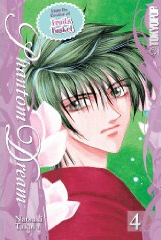
Phantom Dream is a fantasy shoujo series by Natsuki Takaya, manga-ka of popular series Fruits Basket. The protagonist, Tamaki, is a young man whose destiny is simple — protect the human race from a species of demons called the Jaki — but his life is far from it. His best friend, Eiji, has inherited the blood of King Hira and therefore makes him Tamaki's enemy. Then there is Tamaki's girlfriend, Asahi, who is the reincarnation of Suigekka, the woman whose death brought the end of a friendship, a friendship that has been reborn in Tamaki and Eiji, conflicts and all. When you aren't sure who your enemy is, and when your duties from eras past go against love itself, who can you trust and who can you protect?
Highlights:
In volume four of Phantom Dream, Eiji, who had been attacked by humans afraid of the Jaki, is dying. In tandem to this, Tamaki goes blind, making the group even weaker. Shahaku, guardian of the sepulcher, approaches Tamaki and the group and transports them to another dimension and tells them how they can save Eiji. Tamaki takes it upon himself to do it alone, leaving Aniue and the others to protect everyone in Tamaki's absence. In the other dimension, Tamaki battles a jahoutsukai who had been exorcised by his grandfather. Asahi appears by Tamaki's side, calling herself Suigekka and tells him to not doubt his decisions, which spurs him to finish the fight. Victory is bittersweet, even as Eiji wakes up, there are more instances of jaryoku taking over human hosts and causing new outbreaks of violence. With the fissure in the sepulcher reaching its limit, Shahaku lets Asahi use it to cross into the human world, letting her know her powers will not work come morning as well as reminding her of their promise. Later, Tamaki and Hideri head out to confront Hira; he is emerging into the human world from the other side, causing black outs and typhoon-like weather across the country. Hideri takes on Roka while Mutsu watches from the sidelines; Tamaki goes on to meet Hira and engages him in battle, only to find his shield spell does not work against Hira, and that his magic has become weaker. Asahi comes back to Tamaki's side, her powers now restored (but only temporarily), to fight Hira. During the battle, Shahaku reveals the truth of Asahi's bargain to protect Tamaki. At the finale of the fight, the ultimate sacrifice of one character puts the future of all Hira's guardians in jeopardy. Mutsu's past, including her first meeting with Roka, is explored in a series of flashbacks as she is conflicted with the news.
A bonus story at the end of the volume looks at Asahi's relationship with her abusive mother, as well as a talented painter who has been imbued with the powers of the Jaki and is now spiteful towards all humankind.
Overview:
For those readers who were fans of Fruits Basket and are eager to see if Takaya's earlier series is just as good . . . prepared to be disappointed. The artwork wavers between good and mediocre; this is clearly a period where Takaya's art style was still developing, and a far cry from the beautiful panels seen in her more popular later series. The elements of fantasy and horror seem to outweigh those of romance, and therein lies Takaya's weak point: she can't make it work. The more horror-specific aspects of the stories are flimsier than the rest. She has taken a popular trope in manga, that of the lovers doomed to be separated by destiny, as well as the trope of evil that reincarnates itself through the era, and brings nothing new to the table. The story itself is hard to follow at times — wait, who is that? Am I supposed to understand what they are saying? Not to mention that any series that requires an index at the front of certain key phrases can prove a daunting volume to read; I don't like having to flip back to the opening pages because I've forgotten what "gohou" or "shieki" means.
There is also Takaya's bonus story featuring Asahi and her mother, who is an abusive drunk and beats her own child. There seems to be a rather flippant attitude towards the issue of domestic abuse, as if Takaya just put the point in the story to create a connection between Asahi and the character Mashiba, who hates everyone. What was the point of it; to create an additional drama? It doesn't add anything to the main story; it is disposable soap opera fluff.
Where Takaya shines though is in the romance scenes. Scenes that focus on the interaction between either Tamaki and Asahi or Roka and Mutsu are the most heartfelt and stirring of the volume. If there is one thing she is a master of, it is tugging at the reader's emotions. Even in this early series, the manga-ka skillfully uses the succession of panels and dialogue to create a wonderful scene between two people, torn apart by time and destiny itself..
ComicsOnline gives Phantom Dream Volume Four 2.5 out of 5 star-crossed lovers.





